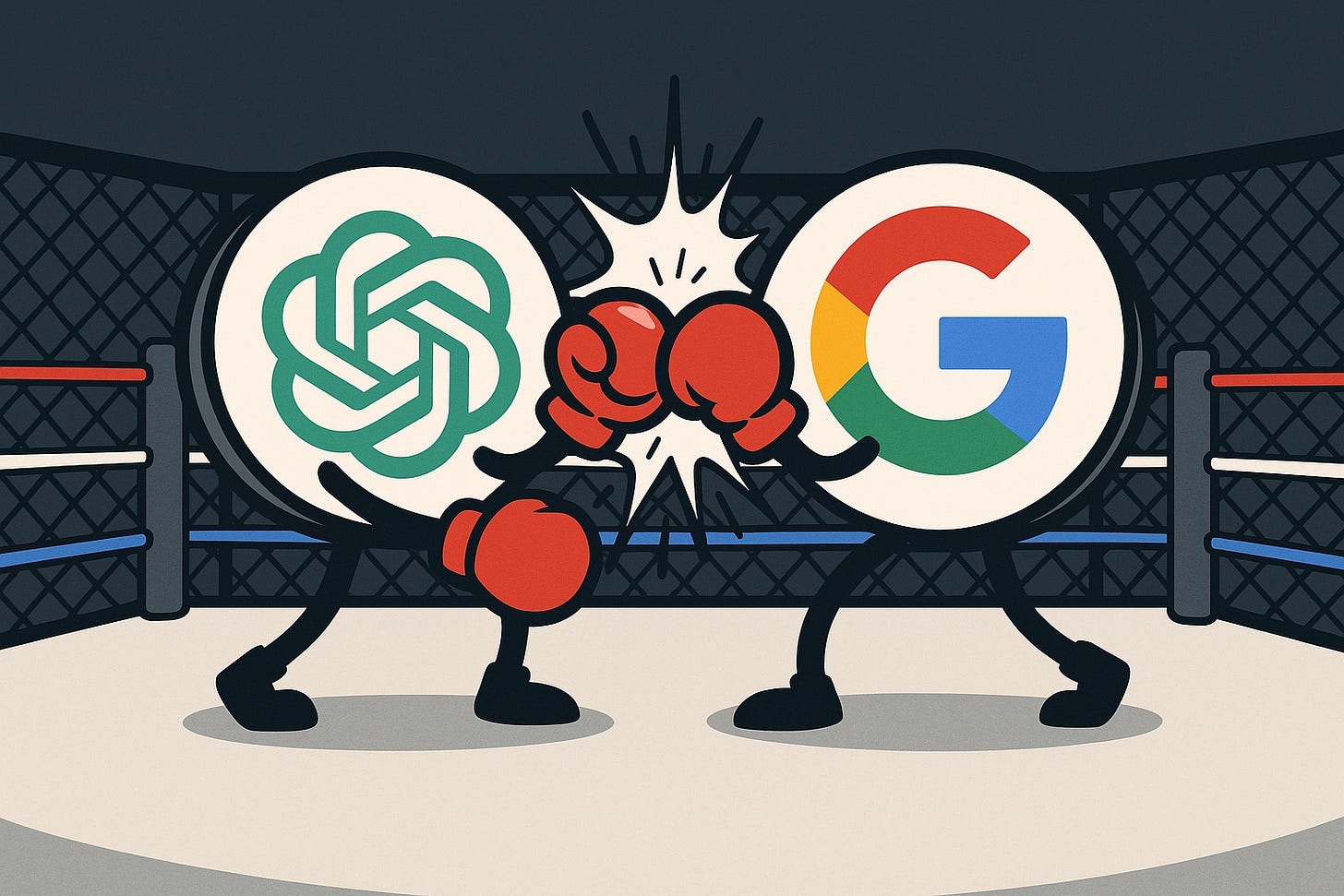Why isn't Google's search volume dropping as ChatGPT grows?
In fact, Google's search volume is accelerating. How can you explain this while ChatGPT continues its exponential growth?
The ultimate tech showdown
It’s now been more than 2.5 years since ChatGPT launched. One thing I’ve been watching closely is the effect on Google’s search dominance. Google has been the unchallenged leader in search for as long as I’ve been using a computer, so the idea of them getting unseated is fascinating.
At first, I didn’t think ChatGPT was eating into Google search at all. For the first year, ChatGPT didn’t have access to real-time information and seemed primarily used in ways distinct from a Google search—i.e., creative writing, coding, brainstorming, etc. There was talk of their user growth slowing during summer break, and Google’s search traffic continued to grow.
However, ChatGPT added real-time search in late 2023, and it clearly became a daily habit for hundreds of millions of users. Naturally, its users started performing searches traditionally done on Google—travel planning, how-tos, and even basic fact retrieval.
Anecdotally, I can say that I and many others now go to ChatGPT before Google for the majority of our queries.
And yet… Google’s search volume and revenue just continue to grow like crazy. They posted Q1 2025 advertising revenue of $66.89 billion, up 8.5% YoY and up almost 70% since 2022. They revealed they have more than 5 trillion searches per year, approximately 14 billion per day, almost double the 8.5 billion/day estimated in 2022.
ChatGPT has an estimated 1 billion queries/day, so one explanation could be that it’s still small in comparison-just 7% of Google’s traffic. But that still doesn’t explain how Google could be growing 8%+ YoY while a new entrant has 1B+ queries/day.
How can both Google and ChatGPT be growing?
I think the answer is clear: ChatGPT is dramatically increasing the size of the search market. GenAI-powered search has opened up entirely new use cases people previously never would have thought to “Google,” yet are perfectly suited for ChatGPT. No one previously went to Google and typed out their whole life story to get therapy or asked for feedback on important texts and emails before sending them.
On top of that, ChatGPT has transformed searches from single queries into back-and-forth conversations, exponentially increasing the number of queries. The multi-turn, context-aware experience is perfect for complex travel planning, writing, research, or even DIY projects at home. ChatGPT has unlocked entirely new search behaviors, ones that wouldn’t have even been thought of as “search” before.
Thus, the reason Google’s search volume continues to grow is that the overall search market itself is expanding rapidly. It’s a growing pie, allowing everyone to show impressive numbers. Google can also rely on its massive ecosystem (Maps, Android, Gmail, Chrome, etc.) to continue driving search traffic while quickly experimenting with adding AI features.
But, in the “new” segment of the search market—generative AI queries—ChatGPT is the tool of choice. This new set of queries is the battleground where ChatGPT is winning, well on its way to over 1 billion monthly users.
What happens from here?
I don’t think both products will continue to grow indefinitely. Consumer search is a winner-take-all market with strong network effects—users prefer a single place for all their searches, and that demand drives both paid and organic content to optimize for the primary search engine. I think OpenAI has realized the opportunity in front of them and has Google squarely in its sights. They already have consumer search and API products that compete with Google’s two primary revenue streams (Search Ads and Google Cloud).
As they continue to grow, I expect OpenAI to launch a browser, productivity/email services, and eventually even hardware as they take on the behemoth that is Google. The ultimate moonshot product for each company is a universal AI assistant, personalized to each user. Delivering this product well requires controlling the end-to-end experience of hardware, operating systems, communication tools, and search.
In the next five years, I anticipate a tipping point. OpenAI’s growth trajectory and strategic expansions will finally dent Google’s seemingly invincible advertising revenue, which will start to slowly—and then rapidly—decline.



Excellent article and very reader friendly!
Looks like Google will have some chatching up to do!